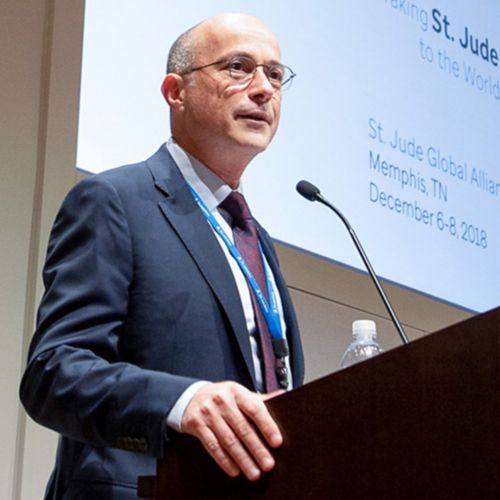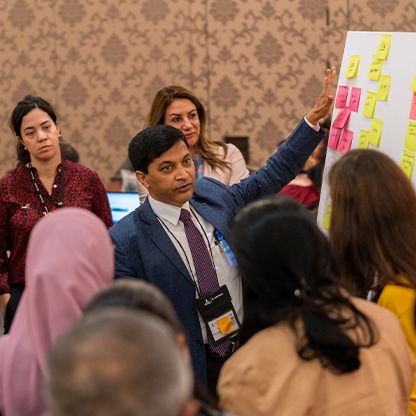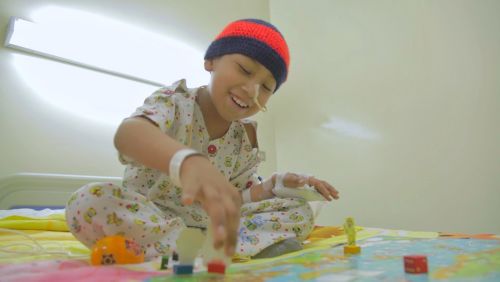St. Jude Family of Websites
Explore our cutting edge research, world-class patient care, career opportunities and more.
St. Jude Children's Research Hospital Home

- Fundraising
St. Jude Family of Websites
Explore our cutting edge research, world-class patient care, career opportunities and more.
St. Jude Children's Research Hospital Home

- Fundraising
Global Scholars: Dr. Thelma Velasquez Herrera
Other Global Scholars Projects:
Dr. Velasquez driven to strengthen Guatemala’s healthcare workforce
Dr. Thelma Velasquez Herrera vividly remembers the morning when, as a young child, she walked into her parents’ bedroom to find her mother suffering complications from a recent surgery for breast cancer.
Her mother was bleeding from her chest and needed to travel to Guatemala City for medical support. There were only two times each morning a bus left her rural town for the city, which meant she had to wait until 4 a.m. the next day to depart.
After traveling more than 200 miles, her mother spent six months in the hospital. Just six years old, Velasquez moved in with her grandmother because her father – a secondary school teacher – spent his weekends traveling to see her mother.
“It was a really hard experience,” Velasquez says. “I remember that I wrote a lot of letters for my mom, every week I sent a letter to her.”
She did not see her mother for six months. Her mother’s ordeal left an impression on the little girl, who decided then and there to become a doctor.
“At the beginning, it was like a dream for me. Because in this little town, it was really difficult to go to the university,” she says. “Among the schools at the university, medicine is one of the more expensive.”
With her family’s support, Velasquez made the dream come true. She is now an attending hematologist-oncologist at Unidad Nacional de Oncología Pediátrica (UNOP), a pediatric cancer hospital in Guatemala City. She is an Associate Professor for the Pediatric Hematology-Oncology Fellowship that trains professionals from Central America and the Caribbean. She is also a consultant for treatment of pediatric renal and liver tumors, soft tissue sarcomas and osteosarcoma within Guatemala.
Velasquez’s childhood experience remains formative: her Global Scholars Project is focused on strengthening the primary health care workforce in Guatemala. She wants to improve the long-term survival and quality of life of pediatric cancer patients. As she seeks ways to build up the front lines of care, patients living in rural areas — like her mother — are never far from her mind.

“Many tumors [in] children are not painful and are not getting them really sick in the beginning. Children can have a small mass in the abdominal cavity that is growing a little bit every day. But it’s not causing vomiting or fever, the things that really [spur] the parents to look for help." -- Dr. Thelma Velasquez Herrera
She wishes her mother had been referred earlier to the hospital in Guatemala City. She lost her breast because of the tumor’s growth. Now as a doctor herself, she sees similar delays occurring for childhood cancer patients.
“Many tumors [in] children are not painful and are not getting them really sick in the beginning,” she says. “Children can have a small mass in the abdominal cavity that is growing a little bit every day. But it’s not causing vomiting or fever, the things that really [spur] the parents to look for help.”
Velasquez says that when parents do seek help at the primary care level, doctors may miss the underlying issue and conclude no care is needed.
Through her Global Scholars Project, Velasquez seeks to address these delays in diagnosis through educational efforts, both for clinicians and government officials. These efforts include:
- Training primary care nurses to identify the signs of cancer,
- Establishing a referral pathway for nurses and others to follow,
- Addressing public misperceptions that cancer cannot be treated successfully.
For Velasquez, her time in the Global Scholars Program has helped shed more light on the cultural, social and economic issues that can impact pediatric cancer patients before they even arrive at her hospital.
“Even if I am telling them, ‘We are going to pay for everything. You don’t have to pay anything, they have to think about it,” she says. “At home, they have more children, more difficulties. They have a constellation of issues to attend to, so that treatment for one of them will be a catastrophic thing for the rest of the family.”
As a six-year-old girl waiting for her mom to come home, Velasquez saw firsthand the impacts that cancer treatment can have on a family. Cancer has always been a personal issue for her. The reasons are many — her mother’s journey; her father’s promise to support her dream of becoming a doctor; the innocence of children; the way cancer has touched other close friends and family members.
“I really think that I have been interested in or trying to learn about cancer all my life,” Velasquez says. “I think that with my project I can make real the second part of my dream, to help people in rural areas like my little town.”


